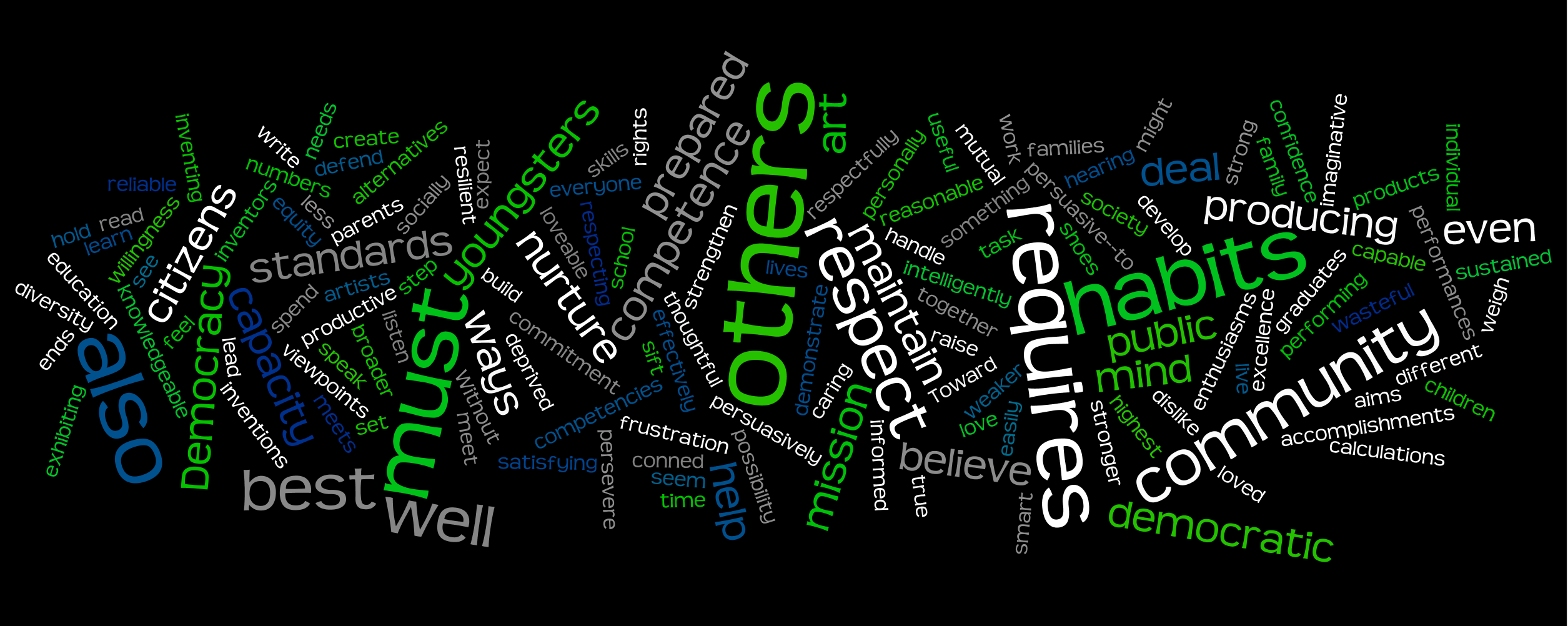
The task of public education is to help parents raise youngsters who will maintain and nurture the best habits of a democratic society be smart, caring, strong, resilient, imaginative and thoughtful. It aims at producing youngsters who can live productive, socially useful and personally satisfying lives, while also respecting the rights of all others. The school, as we see it, will help strengthen our commitment to diversity, equity and mutual respect.
Democracy requires citizens with the capacity to step into the shoes of others, even those we most dislike, to sift and weigh alternatives, to listen respectfully to other viewpoints with the possibility in mind that we each have something to learn from others. It requires us to be prepared to defend intelligently that which we believe to be true, and that which we believe best meets our individual needs and those of our family, community and broader public — to not be easily conned. It requires also the skills and competencies to be well informed and persuasive–to read well, to write and speak effectively and persuasively, and to handle numbers and calculations with competence and confidence.
Democracy requires citizens who are themselves artists and inventors — knowledgeable about the accomplishments, performances, products and inventions of others but also capable of producing, performing and inventing their own art. Without art we are all deprived.
Such habits of mind, and such competence are sustained by our enthusiasms, as well as our love for others and our respect for ourselves, and our willingness to persevere, deal with frustration and develop reliable habits of work. Our mission is to create a community in which our children and their families can best maintain and nurture such democratic habits.
Toward these ends, our community must be prepared to spend time even when it might seem wasteful hearing each other out. We must deal with each other in ways that lead us to feel stronger and more loved, not weaker and less loveable. We must expect the most from everyone, hold all to the highest standards, but also respect our different ways of exhibiting excellence. We must together build a reasonable set of standards for our graduates so that they can demonstrate to us their capacity to meet this mission.
Mission Hill School is a democratically-run school directed by principal Ayla Gavins. Ms. Gavins and a group of core faculty members are responsible for all major curriculum, staffing, and scheduling decisions.
The MHS Governance Board is a site-governing body made up of representatives from four constituencies: the family council, the faculty council, student body, and the community sector. The board meets quarterly, and makes decisions by the majority of each constituency. The responsibilities of the board include:
- Selection, supervision, and evaluation of the principal (with the Superintendent having final approval)
- Setting and maintaining the school mission
- Approval of the annual staffing and budget plan presented by the staff
The MHS Family Council consists of every parent, caregiver, guardian and family member of a MHS student. The Family Council meets each month, to:
- Share information and discuss timely issues
- Coordinate parent volunteer opportunities
- Arrange school events and fundraisers
- Support orientation for new families
2019-2020 Team:
Alicia McKinney, Co-Chair